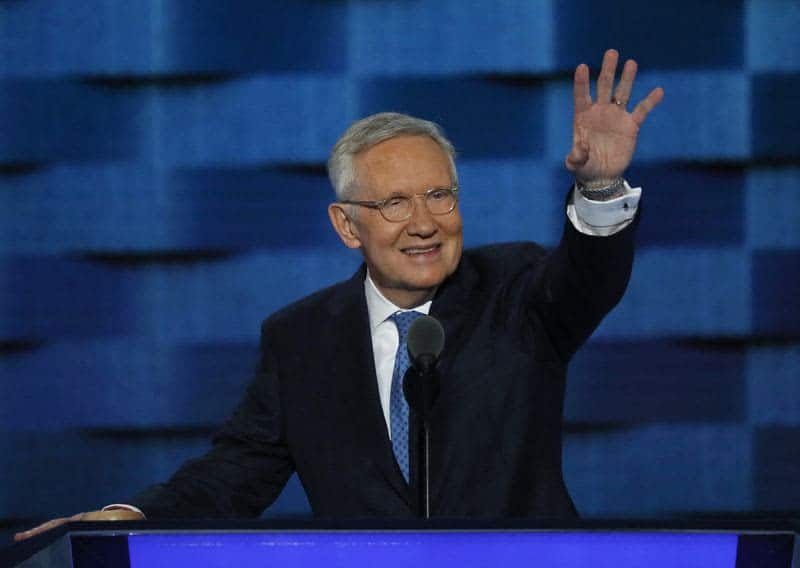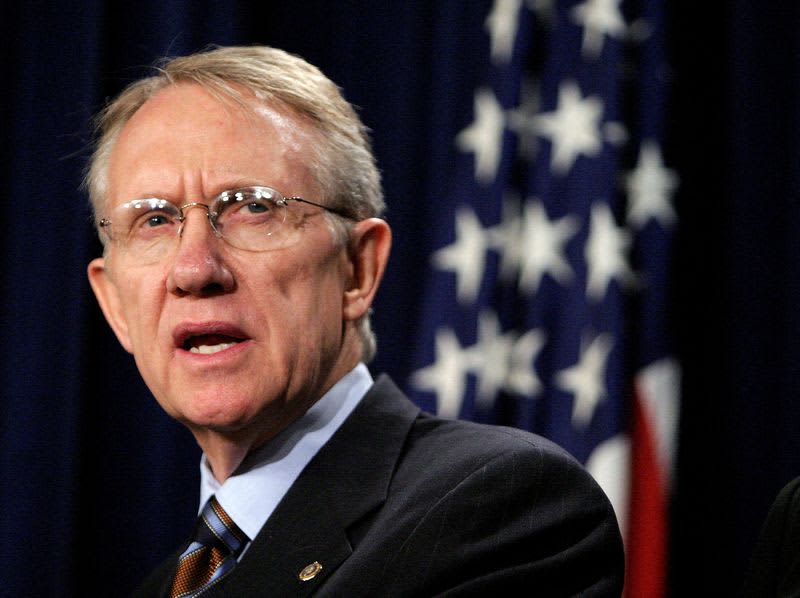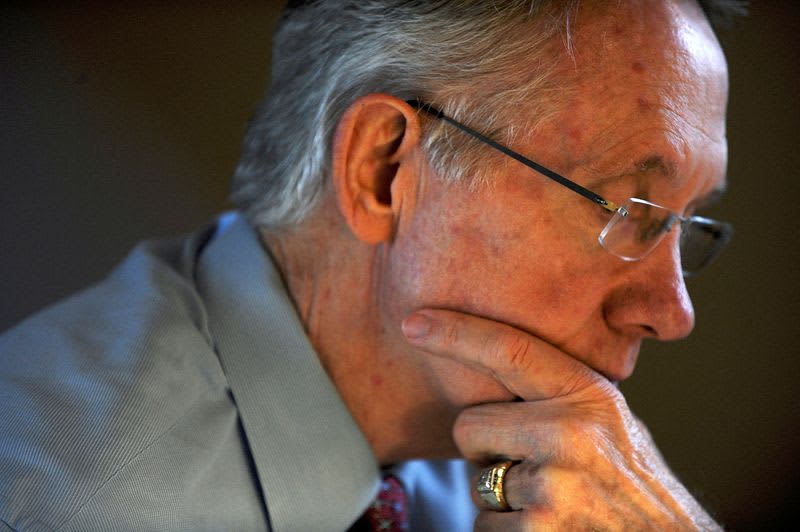Reuters

By Will Dunham
WASHINGTON (Reuters) -Harry Reid, the pugnacious son of a Nevada hard-rock miner who rose from poverty to become the U.S. Senate majority leader and earned a reputation as a fierce partisan fighter during an era of political gridlock in Washington, died on Tuesday. He was 82.
Reid, a former amateur boxer who represented Nevada in the U.S. Congress as a Democrat for more than three decades, died after a long battle with pancreatic cancer, his wife of 62 years, Landra, said in a statement.
“I’ve had the honor of serving with some of the all-time great Senate Majority Leaders in our history. Harry Reid was one of them. And for Harry, it wasn’t about power for power’s sake. It was about the power to do right for the people,” U.S. President Joe Biden said in a written statement.
U.S. Vice President Kamala Harris said late on Tuesday that the country had lost an honorable public servant, adding that the Reid made a meaningful difference in people’s lives.
“Harry Reid rose through the ranks in Washington, becoming Senate Majority Leader, but he never forgot his humble beginnings in Searchlight, Nevada – and he always fought for working families and the poor,” Harris said in a separate written statement.
As majority leader, Reid served as President Barack Obama’s point man in the Senate and helped secure congressional passage of Obama’s signature healthcare law, known as Obamacare, in 2010 over furious Republican opposition.
Obama on Tuesday posted to social media a recent letter he had written to Reid:
“You were a great leader in the Senate, and early on you were more generous to me than I had any right to expect,” Obama said in the letter. “I wouldn’t have been president had it not been for your encouragement and support, and I wouldn’t have got most of what I got done without your skill and determination.”
Reid retired in 2016, one year after suffering broken ribs and facial bones and injuring an eye in an accident while exercising at home.
He had ascended to the job of majority leader in 2007 despite being a political moderate who differed from many in his party on abortion, the environment and gun control. In that job Reid regularly clashed with the Republicans and maintained poor relations with the opposition party’s leaders.
“I always would rather dance than fight but I know how to fight,” Reid said in 2004, in a reference to his boxing career.
In 2012, Mitch McConnell, then the Senate’s top Republican, labeled Reid “the worst leader in the Senate ever” while Reid accused McConnell of a breach of faith on an important issue.
During Reid’s time as majority leader, major legislation languished because Democrats and Republicans could not compromise. His relationship with McConnell was so strained that the Republican leader shunned Reid during crucial U.S. fiscal policy talks and dealt directly with Vice President Joe Biden.
“The nature of Harry’s and my jobs brought us into frequent and sometimes intense conflict over politics and policy. But I never doubted that Harry was always doing what he earnestly, deeply felt was right for Nevada and our country. He will rightly go down in history as a crucial, pivotal figure in the development and history of his beloved home state,” McConnell said in a written statement.
In 2013, fed up with Republican procedural moves blocking Obama’s judicial and executive branch nominees, Reid pushed through the Senate a historic change to the Senate’s filibuster rules, preventing a minority party from blocking presidential appointments except those to the Supreme Court.
Republicans said the move was a naked power grab.
Reid was first elected to the House in 1982 and was sent to the Senate by Nevada voters in 1986. He showed remarkable resilience, fighting off spirited re-election challenges.
HUMBLE ORIGINS
Tact was not Reid’s strong suit. He called Republican President George W. Bush a “loser” and “liar” and said Federal Reserve chief Alan Greenspan was “one of the biggest political hacks we have in Washington.”
He apologized in 2010 for referring to Obama, the first black U.S. president, in private conversations two years earlier as “light-skinned” with “no Negro dialect,” saying, “I deeply regret using such a poor choice of words.”
Reid became a Mormon as a young man and eventually became the highest-ranking member of the Church of Jesus Christ of Latter-day Saints in U.S. public office.
During the 2012 presidential race, Reid became a Democratic attack dog, accusing Obama’s Republican challenger Mitt Romney of paying no federal income taxes for 10 years. Romney insisted he paid “all the taxes required by law.”
Harry Mason Reid was born into a poor family in the tiny desert mining town of Searchlight, Nevada, on Dec. 2, 1939. His father was a miner with an eighth-grade education who committed suicide in 1972.
His mother, who never finished high school, took in laundry from brothels to help out financially. The family lived in a small cabin with no indoor plumbing, hot water or telephone.
“I learned in America, it doesn’t matter the education of your parents, what their religion is or isn’t, their social status – we had none – the color of their skin or their economic status. I am an example of this. If I made it, anyone can,” Reid said in 2007.
Reid attended a two-room school through eighth grade, then hitchhiked 40 miles (64 km) each week to high school, boarding with local families before hitchhiking home each weekend.
He graduated from Utah State University in 1961 and then worked nights as a U.S. Capitol policeman while he attended law school at George Washington University in Washington. He earned his law degree in 1964 and moved back to Nevada.
Reid was a trial lawyer and held various Nevada state offices. He headed the Nevada Gaming Commission from 1977 to 1981.
In the Senate, Reid won passage of an ethics measure barring senators from accepting gifts, meals or trips from lobbyists in 2007.
He voted for Iraq war resolutions in 1991 and 2002. While Reid remained a backer of the first Iraq war, he reversed himself and opposed the second one, accusing Bush’s administration of misleading the nation into it.
Reid and his wife, Landra, had five children.
(Reporting by Will Dunham; Additional reporting by Eric Beech, Dan Whitcomb and Moira Warburton and Anirudh Saligrama in Bengaluru; Editing by Himani Sarkar, Sandra Maler and Raju Gopalakrishnan)





